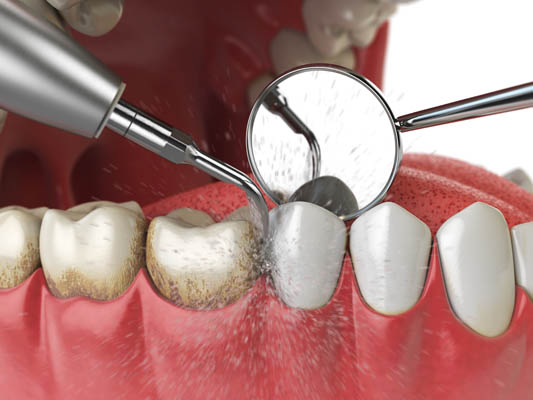A dental deep cleaning is often necessary when gum disease worsens and puts teeth and underlying bone in jeopardy of serious concerns. Routine dental cleaning cannot adequately address issues of severe gum disease (periodontitis), whereas a dental deep cleaning can clean towards the root of the tooth and below the gum surface more effectively.
Signs that indicate dental deep cleaning is necessary
Anytime symptoms of severe periodontitis develop, it is encouraged to visit the periodontist to determine if dental deep cleaning is right for you. Signs that indicate a dental deep cleaning is needed include gum pockets that are four millimeters or greater, bone loss in the jaw, severe gum bleeding, and gum inflammation.
Gum pockets
Ideally, the gums should fit securely around each tooth. However, when severe gum disease develops, gum pockets may occur. This refers to the extra space between the tooth, which is typically the result of gum recession. The America Academy of Periodontology (AAP) recommends dental deep cleanings anytime gum pockets are four millimeters deep or greater. This is because bacteria and food particles may become trapped in the pockets, increasing the severity of gum disease and the risk of other oral health concerns.
Bone loss
Chronic periodontitis can lead to bone loss if it exists for an extended period of time. When this occurs, it can eventually lead to tooth loss and the need for a bone grafting procedure. If the early signs of bone loss are present as a result of gum disease, then the dentist may recommend a dental deep cleaning to address the issue and stop bone loss and possibly reverse minor amounts of lost bone. If severe bone tissue loss occurs, then a bone grafting procedure may be necessary to adequately hold teeth into place.
Severe gum bleeding
Gum bleeding, particularly while brushing teeth, is a well-known symptom of gum disease. A minor amount of blood when brushing too hard is not a huge concern and could be a sign of gingivitis, which is a less severe form of gum disease that is often treatable by good oral hygiene and routine cleaning. However, severe bleeding anytime the gums receive pressure is a sign of more severe gum disease that may need a dental deep cleaning to properly treat.
Gum inflammation
Gum inflammation is also a common symptom of gingivitis and not typically a major concern in the early stages. However, more severe gum inflammation can be an early sign that gum disease has worsened. In this case, the risk of oral infection or gum recession is more likely, and a dental deep cleaning from a periodontist is often the best way to reduce the swelling and address the other symptoms.
Talk to our periodontist team about dental deep cleaning
Call us today to speak with an experienced periodontist about whether you may need a dental deep cleaning. We can answer your related questions, address your concerns, and arrange a time for you to visit with us for a consultation and a deep cleaning if necessary.
Are you considering a dental deep cleaning in the Odessa area? Get more information at https://www.westtexasperio.com.
Check out what others are saying about our services on Yelp: Dental Deep Cleaning in Odessa, TX.
Related Posts
The Importance of Regular Oral Cancer Screenings
Oral cancer screening is key to detecting early signs of oral cancer improving the chances of successful treatment. Many do not realize oral cancer can develop without any noticeable symptoms. By having …
Dentures: The Tried-and-True Tooth Replacement
Tooth loss makes it hard to chew, speak, and smile confidently. Fortunately, advancements in restorative dentistry offer several solutions for replacing missing teeth, with dentures remaining one of the most reliable and …
Gum Restoration and Contouring: How Aesthetic Tissue Grafting Works
Aesthetic tissue grafting restores gum tissue once it has receded, thins, or becomes uneven. The procedure not only enhances the gums' primary function but also benefits their appearance. Having a basic understanding …
The Long-Term Impact of Bruxism and How Periodontists Can Help
Bruxism is the involuntary grinding or clenching of teeth, and without effective bruxism treatments, the condition can lead to significant damage. Teeth grinding harms your teeth and your gums, jaw, and overall …

